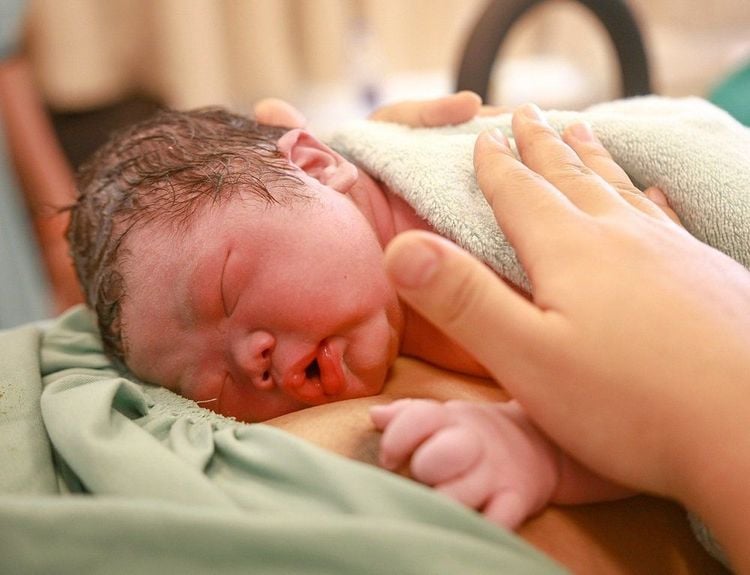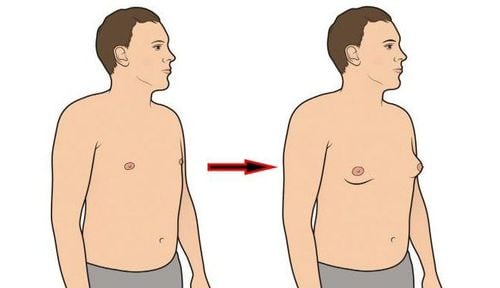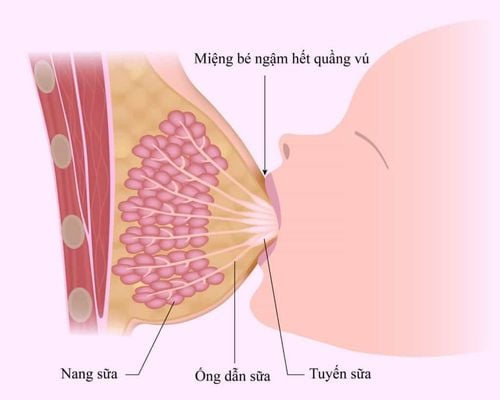This is an automatically translated article.
During the first three months of life (the fourth trimester), babies go through a very important transition – transitioning from the warm, safe, and solitary womb to a world of sensory stimulation. relationships and new relationships. At this time, the child's adaptation to the outside environment will depend greatly on the help of his parents.However, right from birth, babies have the ability to unlock emotional and physical responses. These responses foster connection and care between mother and baby. Below are the natural hormones in the body that help parents fulfill their sacred mission for the little "angel" just born.
1. New-born mother's hormones: Oxytocin and prolactin
In fact, the levels of the hormones progesterone and estrogen in the mother's blood are essential for pregnancy. When levels of these two hormones drop, oxytocin and prolactin levels rise. This signals to your body that the baby is starting a new life with a separate life, and desperately needs love, warmth and care from the mother.Oxytocin - the love hormone Skin-to-skin contact, eye contact, cuddling, cuddling and breastfeeding all trigger the release of oxytocin (the love hormone) inside your body. mother.
Oxytocin will help you build a strong bond with your baby. It also helps you get through the challenging early days of motherhood when round-the-clock breastfeeding seems overwhelming and sleep deprivation starts to take its toll.
During the first few days after giving birth, when the joy and excitement from your new born "angel" begins to fade, you may suddenly feel tired, irritable, even crying. This is a common condition after giving birth, called “Baby Blues” Syndrome, which usually lasts from a few days to a few weeks.
"Baby Blues" syndrome may be partly due to a sudden drop in the hormones your body needs during pregnancy. As your body adjusts to these physical changes, the awareness of your new responsibilities as a mother will be overwhelming with different emotions.
The hormone oxytocin can help you overcome "Baby Blues" Syndrome and relieve anxiety, ease your discomfort in the early days after giving birth. However, it's not the same as postpartum depression (PPD), which can affect both parents and doesn't go away on its own. Prolactin - the hormone that makes milk Prolactin is a hormone that helps stimulate the mother's breasts to produce nutrient-rich colostrum right after childbirth. About 2 or 3 days later, the amount of breast milk will increase more.
Every time a baby breastfeeds, the pituitary gland in the brain secretes more prolactin, along with oxytocin. These two hormones send messages to the mother's breasts to stimulate the production of more milk according to the baby's demand. Even oxytocin and prolactin can spark your motherly love and cope with your baby's day-to-day routines.
Benefits of bottle-feeding If you don't breastfeed, your prolactin levels will drop to pre-pregnancy normal levels. However, you can make more of this hormone during bottle feedings when you hold your baby, make eye contact, sing, and talk to your baby.

iệc tiếp xúc da kề da, giao tiếp với con bằng ánh mắt, cử chỉ ôm ấp, âu yếm và cho con bú đều giúp kích hoạt giải phóng ra oxytocin (hormone tình yêu) bên trong cơ thể của người mẹ
2. New father's hormone: Increase oxytocin and decrease testosterone
New dads should spend more time caring for their babies during the fourth trimester. Embracing and caring for your baby from the very first day helps create a strong bond between father and child.In fact, many studies have shown that the more time and energy you spend taking care of your newborn – from changing diapers to feeding them to waking up at night to care for your baby, the better you will be. bond with your child quickly.
Trust, sensitivity and hormone bonding According to research, just holding your baby can have important hormonal effects.
Within 15 minutes of holding your baby, hormone levels related to tolerance/trust (oxytocin), sensitivity to the newborn (cortisol) and cuddling/bonding (prolactin) will increase.
The more experienced a man is as a caregiver, the faster and stronger these hormonal changes occur. So if you feel more emotional than usual after your baby is born, this is not surprising at all.
As you invest more and more time in your baby's physical care, it gives you the opportunity to build a strong bond with your newborn and support your partner in learning how to parent together.
In addition, hormonal changes in the body also make it easier for you to adjust to your role as a father and as an ally to your partner.
Many studies also show that, when fathers and children are more engaged, it helps children develop better in all aspects, including behavior, cognitive ability and mental health.
Testosterone After giving birth, your testosterone levels will drop temporarily. On the other hand, oxytocin levels will rise higher, making you more open to engaging and more sensitive to your baby's needs.
These feelings of harmony with your baby as well as your partner can make it easier for you to deal with tough challenges during the fourth trimester. Sleep deprivation and fussiness in babies are typical signs of the first trimester of parenting. This can be stressful for you, especially if you've returned to work.
Bonding tips for fathers and children Here are a few tips to help you fuel the "fire" of fatherhood and bonding:
Feel the love: through actions such as holding, reading and talk to your child. In addition, you can carry your baby when moving to create closeness. Learn to recognize cues from your baby, such as wanting to suckle, or to be held. Co-parenting with your partner is a good opportunity to bond. For example, when you're changing your baby's diaper, you'll have plenty of time for eye contact, body contact, and conversation (even if it's just one-way). Sometimes, taking care of your baby alone is for short periods of time. This gives you more confidence in taking care of your baby.

Cảm nhận tình yêu thương thông qua các hành động như bế, đọc sách và nói chuyện với con
3. What if you feel disconnected from your child
Sometimes a parent's love hormones don't immediately translate into a strong enough protective love for their children. There are many factors that influence how you feel as a new parent. It may take longer for you to build a spiritual bond with your baby:It may take longer for you to recover from a difficult birth experience that made you feel uncomfortable, anxious, or worried. or painful. The responsibility of being a parent feels overwhelming. You will have to make decisions about the care of your baby and yourself day and night. How you were raised personally can partly affect how you feel about that experience. If this is your second child, you may be worried about changes in the family and whether your older child will feel left out.

Đôi khi, các hormone tình yêu của cha mẹ không ngay lập tức biến thành một tình yêu thương bảo vệ đủ lớn dành cho con cái
Please dial HOTLINE for more information or register for an appointment HERE. Download MyVinmec app to make appointments faster and to manage your bookings easily.
Article referenced source: babycenter.com












